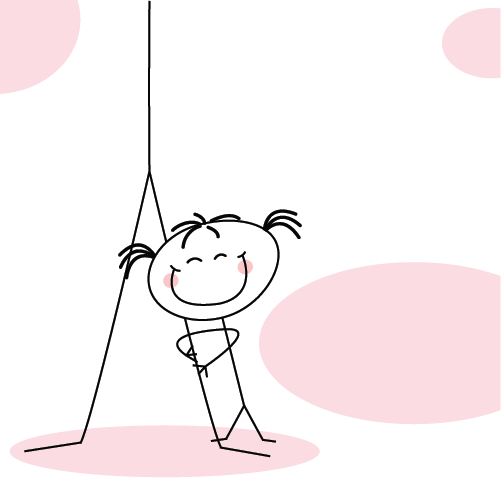My four-year-old, Sophia, is precious. She is adorable, astute, and likes to cuddle. She was also born with a fighting spirit. We sensed it right away and joked that The Force is strong in her. When I changed her newborn diaper like a rookie, she looked up at me like, “Really, Daddy. That’s backwards.” She made me laugh. When she was learning to talk it was, “Really, Daddy. Stop following that car so close.” She insulted my bad driving and I slowed down. Now, it’s “Really, Daddy. You won’t try this new food? Mommy makes me . . . so you do it.” She guilt-trips me into eating tomatoes. Little Sophie cares deeply about most things, has an acute sense of right versus wrong, stands her ground, and sees life a bit more clearly than she should at four.
This fighting spirit will serve her well in life. What a blessing. No one will push her around. She will know what she stands for and who to avoid. She’ll quit a crummy job and inspire passion in others. And, chances are, she’ll make a splash in life. An even bigger plus is that dimwit boys may call, but they won’t stand a chance. This all makes me very happy!
However, her fiery spirit means that Sophia and trouble are well-acquainted. Let me give you some simple tasks that commonly evolve into Struggle Bus moments at the Ciocchetti house:
- Putting on pants; I repeat… putting on pants…
- Taking any steps towards hitting the sack. We might as well tell her she’s going to the dentist.
- Sitting flat on her bottom on a chair at dinner for more than three consecutive minutes.
- Avoiding the urge to rip toys from her sister’s “baby hands” (we call them “baby hands” to emphatically – and sometimes effectively – make the point)!
We laugh at first; it’s funny to watch someone bitterly resist a mindless task. But, it gets exasperating. Sometimes, something special goes into “Toy Jail” – a high kitchen cabinet reassigned to hold toys for really bad behavior until the next morning. It’s a brilliant idea that really works (Team C highly recommends Toy Jail). As you can imagine, Sophie hates it. These moments lead to some stomping of feet and gnashing of teeth. She generally storms off screaming, “Ahhhhh. I’m so frustrated at you guys! Ahhhhh.”
And then something amazing happens. And I mean always happens. After a few minutes (never more than five), Sophie runs back up and hugs my leg. “I’m sorry, daddy,” she says, sometimes through tears. “I should have put on my pants when you asked.” I tell her it’s ok. She needs to hear that. Then, she’s smiling like normal and ready to move on with her day. It’s like as soon as she says, “I’m sorry.” and hears “It’s okay sweetie.” her soul is cleansed of the bitterness and frustration. She’s now ready to refocus on happy times. It’s beautiful to watch because it’s so genuine and consistent. I wouldn’t say that she forgets about the toy that’s been taken away – that part still stings until morning. But she does move on quickly from the fact that she was really mad at us for imposing Toy Jail.
The Moral of the Story: From An Ethics Standpoint
Let’s face it, little kids forgive. It comes so naturally. Then, almost immediately afterwards, little kids forget about their frustration towards you and move on. They do this even if they were really hurt or extremely emotional. They instinctively realize that the important relationships in their lives matter more than a silly fight. Little of this comes from being super-rational beings. Remember, my very intelligent four-year-old struggles with the desire to wear pants or shoes to church. Instead, her moral behavior is innate and tied deeply to her conscience. And her conscience, unimpaired by years of being overridden by bad decisions, still works as it should. It signals that the right thing to do is to forgive and move on. So, she does. Most kids do.
We adults struggle in this arena. We rarely forgive and if we do, we struggle to move past what happened. We remember and hold grudges – all the while adding weight to the negative end of our stress scale. Our adult conscience whispers that this is a poor choice. But we are bull-headed, and we put our conscience on mute again. We want to be better at this but, it’s harder as we get older.
So, here’s some advice: Forgive like a little kid! And here’s why.
There is a Buddhist proverb that says, “Holding on to anger is like drinking poison and expecting the other person to die.” The anger, frustration, and discontentment we feel when mad at someone else generally hurts us worse than it hurts them. We are the ones who acutely sense these negative sensations. The other person might even think we have moved on. Often, the people you dislike tend to move on from you far before your anger fades. Usually, carrying this anger and frustration is completely counter-productive.
It is also a bit hypocritical. I’ve been a lawyer for a long time. And over all those years, I rarely see a fight where one party was 100% right and the other 100% wrong. There are rare situations where that’s true; I just rarely encounter them. Instead, each party bears a percentage of the responsibility for each fight. Sometimes it’s 60% to 40%, others it’s 80% to 20%. Either way, both sides bear some responsibility. An important key to a happy life is to apologize for your part. You do this for the other person to be sure, but it’s mostly for you. You need a path forward to free yourself from the stress and anger of broken relationships.
However, this does not mean that you have to keep the other person around. People have to earn a place in your life. That’s a separate and much deeper conversation. But, by sincerely apologizing, you will be able to move on, to stop your blood from boiling, to avoid tears every time you think of these people. You can encounter them without an argument breaking out or having to hide. You can regain your contentment and composure. Imagine if you could act that way around all the people with whom you’ve experienced broken relationships. The weight of the world would feel like it was lifted off your shoulders. If you know me at all, you know that I’m going to tell you that this is fully possible and solely within your control.
A Three-Step Plan For Moving Forward
If you agree to take a stab at this, then here’s a short primer on the most ethical way to apologize and find a path forward:
- Apologize early and often;
- Mean it; and
- Move on (and decide whether each person has earned a place in your life).
Let’s start with Steps #1 and #2 – the apology stuff – in this post. We can cover the earning a place in your life part later.
Begin by making a list of each of your broken relationships – in the reverse order of how bad each person has hurt you. So, the easier relationships to fix will be at the top of your list. Then, pick person #1 and go apologize for your part in the fight. If it has to be via text because that’s easier or less emotional, then so be it. At least you’re apologizing. If you want them back in your life or you want the apology to have its maximum impact, however, then speaking over the phone or in person is critical.
When you make the attempt, let’s begin with how NOT to apologize. I repeat, do not say anything like this: “Hey (person who I hurt in the past and to whom I am now trying to apologize), I read this article about forgiveness. It’s on a great blog . . . so, check that out when we’re done. That guy Corey made me realize that I hurt you a bit. But, you hurt me more. So, I’m like 30% sorry. Cool?” That “apology” will rise like a lead balloon. I’m teasing you a little. But, don’t underestimate that it will be tempting to minimize your part of the apology – especially if your calculated percentage of wrongness is low. Avoid that urge. Other lame apologies include:
- I’m sorry if I offended you;
- I’m sorry if I hurt your feelings; and
- I’m sorry, but you hurt me too.
The chances are you don’t really mean it when you apologize this way. So, let’s apologize like they teach Sophie in preschool.
“I’m sorry.”
That’s it. In preschool, they don’t even bring up the fact that it’s okay to add, “I’m sorry if you were offended,” “I’m sorry if I hurt your feelings,” or “I’m sorry, but you hurt me too.” Their apologies are just simple and straightforward. The period and stop at the end of the apology is important. It marks the end of your apology and places the blame on you. This takes some humility and makes the whole thing far more sincere. More importantly, it marks the end of that stage of your life, a fresh start.
So . . . start apologizing like a kid. Then, move on with a smile on your face like a kid. Try and mark one apology off your broken relationships list each month. And, unless, you’ve been a real jerk for a long time, your list should virtually disappear before you know it. My bet is that you, your stress level, and your conscience will be glad you took on this challenge. Go regain your fighting spirit to apologize.
- Check out COREYSPEAKS.COM for more on keynote speaker Corey Ciocchetti. Corey has popular keynotes on ethical leadership, morale, stress reduction, and professionalism.
- Check out Corey’s other cool leadership and ethics posts on LEADERSHIP and HAPPINESS – you won’t regret it.
- Check in with Corey’s ethics blog often to check out new compelling content.


